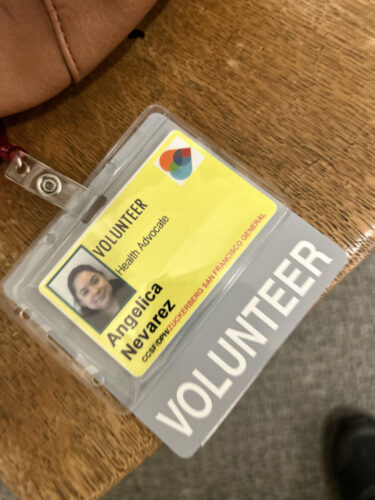City College’s Historic Community Health Worker Program Changes Lives
By Ellen Yoshitsugu
Email egiese@mail.ccsf.edu
A Community Health Worker (CHW), or Promotor de Salud, is a trusted community member, paid or unpaid, who provides a bridge for their community to the health care system and related social services. The CHW certificate program in City College’s Health Education Department has been preparing CHWs for decades.
Institutions have realized that not only are CHWs “cost effective,” they are more effective than the medical system alone.

“CHWs are frontline agents of change, helping to reduce health disparities in underserved communities,” according to the Health Disparities Initiative of the National Institutes of Health.
Students come to the CHW program by diverse paths. As a child, program manager Andrew Ciscel was the main medical support person for his mother who had multiple sclerosis. Becoming a CHW felt right to him.
Some students were health professionals in their home countries, and with a CHW certificate they can continue working in health care while they improve their English, according to Ciscel. Or students can apply for a permanent job with the SF Department of Public health (SF DPH).
Inspired by the support her family got at the University of California San Francisco medical center during her great grandmother’s last days, Angelica Navarez said, “I felt like I needed to give back.” Navarez, who is the Associated Students President for John Adams campus, volunteers as a health advocate at SF General Hospital while continuing her public health studies.
Nevarez said that people think, “I can’t go to the doctor, I already have this medical bill,” or “I’ll just drive myself because the ambulance is $700,” or “I’ll just handle this at home because they might ask me for my paperwork.” As a CHW she helps connect them to services.
For example, when her clients complain of rodents or mold in their homes, she fills out the forms, recaps with the client, and relays that information to SF DPH, saying “we need someone to come out here because this is impacting the client’s asthma.”
CHWs, because they share their client’s lived experiences, “have an urgency to get things done,” and an “empathy that you can’t train,” she added.
Coming out of prison after 20 years, another City College program graduate, Joe Calderon, first encountered Transitions Clinic Network (TCN) as a client, and now works there as a Senior CHW and National Trainer. The nonprofit, founded in San Francisco’s Bayview district, helps individuals with chronic conditions navigate the medical system as they return to the community from prison.
“I spent all those years in a box,” said Calderon.” I had the opportunity to address a lot of my shadows and learn to understand my own triggers. And I learned how trauma is one of our community’s shadow enemies that’s not being addressed.”
He said that if trauma is addressed early and correctly, then many people have the chance to make better choices, “knowing that there’s nothing wrong with me, but that there’s something that happened to me.”
Today he seeks to empower the community around healthcare and to make amends for the harm he caused, “prior to me knowing who I was.”
“I realized that I was a community health worker, long before I was getting paid for it.”

City College offers related certificate programs such as Addiction and Recovery Counseling and Healthcare Interpreting. They also offer two year and transfer degrees. Units earned towards certificates transfer as electives to four year colleges.
Following recent budget cuts, the CHW program retains most of its electives as areas of emphasis such as elder or youth advocate, HIV and hepatitis care, or health impacts of incarceration, all within the CHW certificate.
One of the oldest in the U.S, the City College program is a respected leader in the growing field. They literally wrote the CHW textbook, now in its third edition, and trained more CHWs than any other institution.
The value of CHWs in dealing with misinformation and mistrust became obvious during the pandemic. According to Beth Freedman, Health Education department chair, SF DPH hired all their students, saying, “Please send us your students! We need them!”
The CHW model is already widely used internationally. In Costa Rica, public health workers known as ATAP (Asistente Tecnico en Atencion Primaria) are an integral part of their medical system, according to Atul Gawande in a 2021 New Yorker article. “In the United States and elsewhere, public health and medical care are largely separate enterprises. Costa Rica shows the benefits of integrating the two – it spends less than we do and gets better results.”
CHWs are usually funded through grants. Of the four cohorts currently in City College’s program, three are grant funded through arrangements with Sonoma County, the San Francisco Community Clinic Consortium and The Homeless Prenatal Program.
But recently millions of dollars have been allocated to hire tens of thousands of CHWs across California as part of a major multi-year overhaul of the state’s Med-Cal system, California Advancing and Innovating Med-Cal (CalAIM), currently underway.
So counties and other providers can now bill the federal government for hiring CHWs, thus greatly expanding the workforce.
Deeply involved in the roll-out of CalAIM at the state level, Calderon advocates not only for CHWs, but also to ensure that justice-involved persons can join the CHW workforce.
The roughly 650,000 people who leave prison every year in the U.S. face many thousands of discriminatory laws sharply limiting their participation in all aspects of society, Calderon said.
“Without employment, you have hopelessness,” he continued, and without hope people return to what they already know.
For real change, the community must be at the table defining the problem and identifying solutions, Calderon said, and the new state CHW certification process must be inclusive, adopt some kind of fair chance for the formerly incarcerated and include a reasonable way to appeal decisions.
“The status quo has never helped the communities that I come from,” he added.
